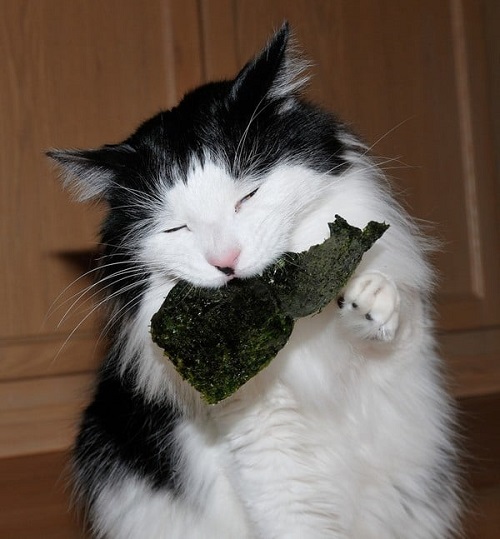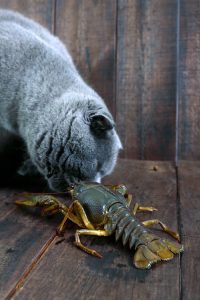Do you love sea-food and wondering Can Cats Eat Seaweed? Well, our informative guide will clear your confusion for good!
If you’ve ever been curious about what your furry feline friend might find tasty, you’re in for a treat! Have you ever wondered – Can Cats Eat Seaweed? Get ready to learn all about this surprising snack! In this article, we’ll explore the nutritional benefits of seaweed and how to give seaweed to your cat safely.
Can Cats Eat Celery? Find out here
What Is Seaweed?
Seaweed, or sea vegetables, are varieties of seaweed that are edible and nutritious. They can be eaten uncooked, cooked, or as an ingredient in other dishes.
Some of the most common varieties of edible seaweed include nori, wakame, kombu, arame, and dulse. Seaweed is rich in vitamins, minerals, and antioxidants, making it a healthy and versatile addition to your diet.
Can Cats Eat Seaweed?
Cats and seaweed? What an interesting combination!
While cats don‘t naturally eat seaweed, some pet owners have found that their cats actually relish its flavor. Some cats love to snack on dried seaweed, while others prefer to nibble on a bit of seaweed that has been steamed or boiled.
The answer to your question is a resounding yes! Cats can eat seaweed. It can also be added to a cat‘s regular diet to boost its nutritional content, as it is rich in vitamins, minerals, and antioxidants.
So, if your kitty loves seafood, why not give them a little taste of seaweed? Who knows, they may love it!
Is Seaweed Toxic For Cats?

No, seaweed is not toxic for cats.
Cats absolutely love seaweed! It has a savory flavor that they find irresistible and is packed with vitamins and minerals that are great for their overall health. Many commercial cat food brands include seaweed as a primary element, and you can even buy special treats made from seaweed for your feline friend.
So don’t be afraid to give your cat a little seaweed snack – they’ll love it! Your cat will be purring with delight after eating this tasty snack!
Does Seaweed Contain Any Nutritional Value For Cats?
Seaweed may not be the first thing that comes to mind when thinking of something to feed your cat, but it can actually provide some nutritional value.
- Seaweed contains high levels of iodine, which is important for cats, as it helps to regulate their metabolism.
- Seaweed also contains Omega–3 fatty acids, which can help promote a healthy coat and skin, as well as a healthy heart.
- Seaweed contains vitamins A, D, E, and K, and minerals such as calcium, iron, and magnesium.
How To Feed Seaweed To Cats?
Start by purchasing some dried seaweed from your local pet store. You can also purchase organic seaweed online. Once you have the seaweed, clean and cut it into small pieces and sprinkle it over your cat‘s food, or offer it as a stand–alone treat. Your cat may take a few tries to get used to it, but soon they‘ll be begging for more!
Cats can eat a surprising amount of seaweed without any adverse effects! While there are not many studies on the specific amount of seaweed cats should eat, most cats can safely eat a teaspoon of seaweed per day.
Can Cats Eat Seaweed? A Few Concerns.
Feeding seaweed to cats can be a great way to provide them with additional vitamins and minerals, but there are a few concerns that should be taken into account.
- Seaweed can be difficult for cats to digest and may cause stomach problems or even vomiting.
- The high salt content in some varieties of seaweed can be dangerous for cats, leading to dehydration and electrolyte imbalances.
- Cats may find the taste of seaweed off–putting, so it‘s important to ensure your cat is interested in it before giving it as a regular part of their diet.
- Some cats may be allergic to seaweed, so it‘s important to monitor your pet for any signs of an allergic reaction.
Can Cats Eat Seaweed? Something Important!

With the following tips in mind, your cat can enjoy all the wonderful health benefits that seaweed provides.
- To be on the safe side, it is best to consult with a vet before giving seaweed to your cat.
- Make sure you are using a seaweed specifically made for cats.
- Monitor your cat’s reaction to the seaweed and look out for any signs of allergic reactions.
- Make sure that the seaweed is washed and dried before feeding it to your cat.
- Keep the seaweed away from sunlight, as it can cause the seaweed to spoil and become unsafe for your cat.
Can Cats Eat Seaweed? Quick Takeaways!
- Seaweed is a great snack for cats as it provides them with important minerals and vitamins.
- Commonly, cats love the taste of seaweed.
- There are a few drawbacks of feeding a lot of seaweed to your cat, like stomach problems, dehydration, and allergies. So, consult a doctor if any unusual symptoms arise.




